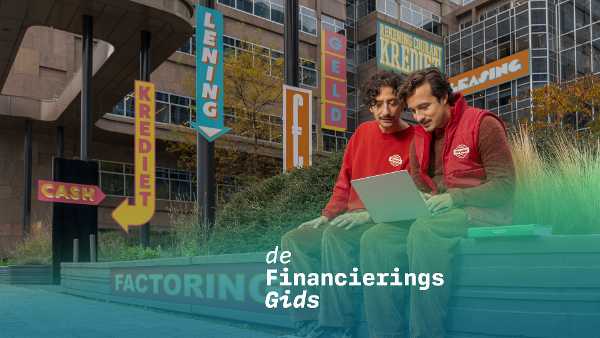Types of financing

- The basis
- 15 November 2024
- Edited 18 July 2025
- 2 min
- Managing and growing
- Finance
When you are looking for funding for your business plans, there are many forms of financing you can use. From business loans to crowdfunding and from factoring to leasing. You can also combine business financing with money from a grant or scheme. Here is an overview of the options.
Types of financing for businesses
| Business angels | A business angel is a private investor who provides equity, knowledge, and a network to fast-growing companies in exchange for an equity stake or control. Business angels play an important role in the start-up world. |
| Crowdfunding | Crowdfunding is a form of financing where you raise money from many people via an online platform. Each person contributes a small amount to support your project or venture. |
| Factoring | Factoring is a form of financing where your company sells outstanding invoices to a factoring company. In this way, you improve your cash flow because you receive money quickly without waiting for customers to pay. |
| Borrowing money from family and friends | Borrowing from family and friends is an informal form of financing where you borrow from people you know. Often the terms of the loan are more flexible than with banks and other financiers. However, it can lead to problems with relationships if repayment becomes difficult. |
| Credit union | A credit union is a not-for-profit cooperative that focuses on lending by entrepreneurs for entrepreneurs. Members put in money and can borrow themselves, with support and advice from fellow entrepreneurs. |
| Leasing | Leasing is a form of financing for business assets, such as a car or machine. You use the asset without buying it. The leasing company owns it, and you pay a fixed amount per month to the leasing company. |
| Stock exchange for SMEs | An SME stock exchange is a platform where medium-sized and small businesses can raise capital by issuing shares or bonds. Investors can invest and trade in the securities of these companies. |
| Overdraft facility | An overdraft is a loan linked to a business bank account where you withdraw money up to an agreed limit. You pay interest on the amount withdrawn. You can make deposits and withdrawals whenever you want to. |
| Venture capital | Venture capital is a form of financing, in which an investor puts money into fast-growing companies in exchange for a stake in the company. The investor aims to make a long-term profit by selling the shares. |
| Business mortgage | A business mortgage is a loan you use to finance the purchase of a business property. The property is the security for the repayment of the loan. |
| Business loan | A business loan is a loan that companies use to finance their investments, such as equipment or growth. The company receives the loan amount in one lump sum and repays it in fixed instalments with interest. |
Subsidies and schemes
To stimulate the economy, the government offers financial support to entrepreneurs through subsidies and schemes. Innovative and sustainable investments in particular are eligible. Use the RVO Subsidy and Funding Guide to check whether there is a subsidy or scheme for your business plans.
Stack finance
Stack financing means that you combine several forms of financing. That way, you get the total amount you need together. Instead of one (large) loan, you use several forms of business financing at the same time.
Using the Financing Finder Tool
Find the form of financing that suits your plans with the Financing Finder. Answer the questions and see the results. In the decision aid you will find financing products from participating financiers.
The Financing Guide is a collaboration between KVK, the Dutch Ministry of Economic Affairs, the Dutch Banking Association (NVB), Stichting MKB Financiering (SME Financing Foundation), and the Netherlands Enterprise Agency (RVO).


